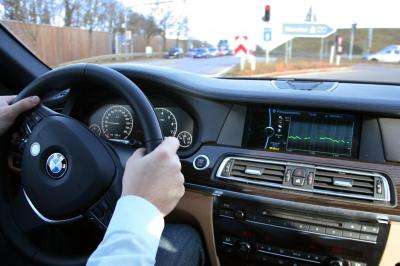Health check on the road

Safety in traffic depends on a number of factors. One decisive aspect is how fit the driver is. A research team at the Technische Universitaet Muenchen (TUM), in collaboration with researchers at the BMW Group, managed to develop a sensor system integrated into the steering wheel that can monitor the driver's state of health while driving. The driver can use his time behind the wheel for a minor health check. At the same time the device might be used recognize the onset fainting spells or heart attacks.
If you spend a lot of time driving, in addition to listening to the radio or making phone calls, in the future you will be able to undertake a small health check. Together with researchers from the BMW Group, scientists at the TU Muenchen Chair of Micro Technology and Medical Device Technology (MiMed) directed by Professor Tim C. Lueth have developed a system that monitors vital signs such as heart rate, skin conductance and oxygen saturation in the blood via simple sensors in the steering wheel.
A series of systems for monitoring vital signs while driving have already been developed in the context of studies to measure stress levels while driving, among other things. However, none of these systems are suited for automotive mass production. By integrating appropriate sensors into the steering wheel, the scientists managed to circumvent the laborious wiring of the driver. The data collected is radioed to a microcontroller, which in turn can show the measurement results on the vehicle information system display.
A driver's skin conductance, for instance, reveals whether he or she is under severe stress, or whether his or her blood pressure exceeds a critical value. The only requirement is that the driver's hands are in contact with the sensors integrated into the steering wheel. Initial tests with people in cooperation with the Munich Senior Citizens Advisory Council were very promising. The sensors integrated into the steering wheel provided data during four fifths of the driving time. More than half of the test persons felt incited by the system to conduct repeated check-ups.
The goal of the project goes far beyond monitoring vital signs and recognizing dysfunctions. "Our vision is to get the vehicle to detect when the driver is no longer feeling well and to the initiate appropriate measures," says Professor Lueth. "When a stress situation is detected by means of skin conductance values, phone calls can be blocked, for instance, or the volume of the radio turned down automatically. With more serious problems the system could turn on the hazard warning lights, reduce the speed or even induce automated emergency braking."
Two commercially available sensors are key elements of the integrated vital signs measurement system. One of them shines infrared light into the fingers and measures the heart rate and oxygen saturation via reflected light; the second measures the electric conductance of the skin at contact.
The scientists at MiMed have also developed a micro-controller application that processes the data and transfers them back to the vehicle. In order to extend the data pool and make as many reliable assertions as possible on the state of a driver's health, a radio connection can be established to additional external devices, e.g. a blood pressure monitor.
These results ensued from the research project Fit4Age in the "Assistance Systems for an Aging Society" group and were funded with grants from the Bavarian Research Foundation (BFS). Cooperation partners at the BMW Group did the technical installation of components into the vehicle.
Provided by Technische Universitaet Muenchen



















